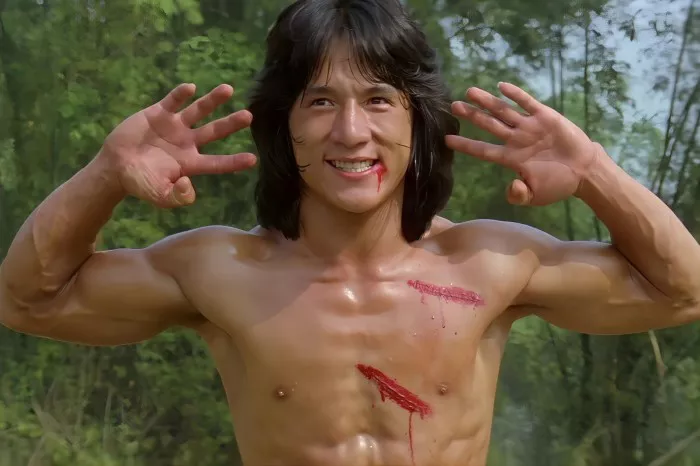Jackie Chan and Bruce Lee are both iconic figures in the world of martial arts and cinema, but they are distinctly different individuals who have made their own unique contributions to the entertainment industry. In this exploration, we’ll delve into the lives, careers, and legacies of Jackie Chan and Bruce Lee, highlighting their similarities and differences while celebrating their enduring impact on audiences around the world.
Bruce Lee: The Martial Arts Visionary
Bruce Lee, born on November 27, 1940, in San Francisco, California, is widely regarded as one of the most influential martial artists of all time. His groundbreaking martial arts skills, philosophical teachings, and charismatic on-screen presence propelled him to international fame and established him as a cultural icon.
From a young age, Bruce Lee displayed an innate talent and passion for martial arts. He began studying Wing Chun Kung Fu under the tutelage of renowned master Ip Man in his native Hong Kong, honing his skills and developing his own unique martial arts philosophy.
Lee’s martial arts journey took him to the United States, where he continued to refine his craft and share his knowledge with students and enthusiasts alike. Through his teachings and demonstrations, Lee sought to demystify martial arts and promote a holistic approach to physical fitness and self-defense.
Bruce Lee’s breakthrough role came with the television series “The Green Hornet,” where he portrayed the iconic character Kato. His dynamic fighting style and magnetic screen presence captivated audiences, laying the groundwork for his transition to leading roles in film.
In 1971, Bruce Lee returned to Hong Kong and starred in “The Big Boss,” his first major film role. The film’s success catapulted him to stardom, paving the way for a string of martial arts classics, including “Fist of Fury” and “Way of the Dragon.”
However, it was Bruce Lee’s iconic portrayal of the martial arts master in “Enter the Dragon” that solidified his status as a global superstar. Released posthumously in 1973, the film became a cultural phenomenon and remains a cornerstone of martial arts cinema to this day.
Tragically, Bruce Lee’s life was cut short when he passed away at the age of 32 on July 20, 1973. Despite his untimely death, his legacy endures, inspiring generations of martial artists, actors, and filmmakers with his indomitable spirit and groundbreaking contributions to the world of martial arts and entertainment.
Jackie Chan: The Action Comedy King
Jackie Chan, born on April 7, 1954, in Hong Kong, is a multifaceted talent known for his incredible martial arts skills, comedic timing, and daring stunt work. Often dubbed the “King of Action Comedy,” Chan has captivated audiences around the world with his unique blend of martial arts prowess and slapstick humor.
Like Bruce Lee, Jackie Chan began his martial arts training at a young age, studying at the China Drama Academy under the guidance of Master Yu Jim-yuen. His rigorous training in traditional Chinese martial arts laid the foundation for his future success in the entertainment industry.
Chan’s big break came when he was cast as a stuntman in Bruce Lee’s films “Fist of Fury” and “Enter the Dragon.” Inspired by Lee’s charisma and athleticism, Chan began to pursue a career in acting and stunt work, determined to carve out his own path in the world of cinema.
In the 1970s, Jackie Chan rose to prominence as a martial arts film star in Hong Kong, starring in a series of successful action films such as “Snake in the Eagle’s Shadow” and “Drunken Master.” His acrobatic fighting style and comedic flair set him apart from his contemporaries, earning him a dedicated fanbase and critical acclaim.
However, it was Jackie Chan’s groundbreaking work in the “Police Story” series that propelled him to international superstardom. Known for their jaw-dropping stunts and high-octane action sequences, the “Police Story” films showcased Chan’s unparalleled dedication to pushing the boundaries of physicality and spectacle in cinema.
Unlike Bruce Lee, who focused primarily on serious martial arts dramas, Jackie Chan distinguished himself with his signature blend of action and comedy. His willingness to perform his own stunts and embrace slapstick humor endeared him to audiences of all ages, making him a beloved figure in global cinema.
Throughout his career, Jackie Chan has continued to evolve as an actor, director, and producer, exploring diverse genres and collaborating with filmmakers from around the world. From his early martial arts classics to his more recent Hollywood blockbusters, Chan’s versatility and creativity have solidified his status as an international icon.
The Legacy of Bruce Lee and Jackie Chan
While Bruce Lee and Jackie Chan are distinct individuals with their own unique styles and approaches to martial arts cinema, their contributions to the world of entertainment are equally significant. Bruce Lee’s groundbreaking achievements laid the groundwork for the modern martial arts film genre, inspiring generations of filmmakers and actors with his unparalleled skill and charisma. Meanwhile, Jackie Chan’s innovative blend of action and comedy has redefined the possibilities of martial arts cinema, captivating audiences worldwide with his boundless energy and creativity.
Both Bruce Lee and Jackie Chan have left an indelible mark on the world of cinema, transcending cultural boundaries and inspiring millions with their talent, passion, and dedication to their craft. While they may have followed different paths, their legacies continue to shine brightly, reminding us of the transformative power of martial arts and the enduring appeal of great storytelling.
https://www.rnada.com/archives/12574

